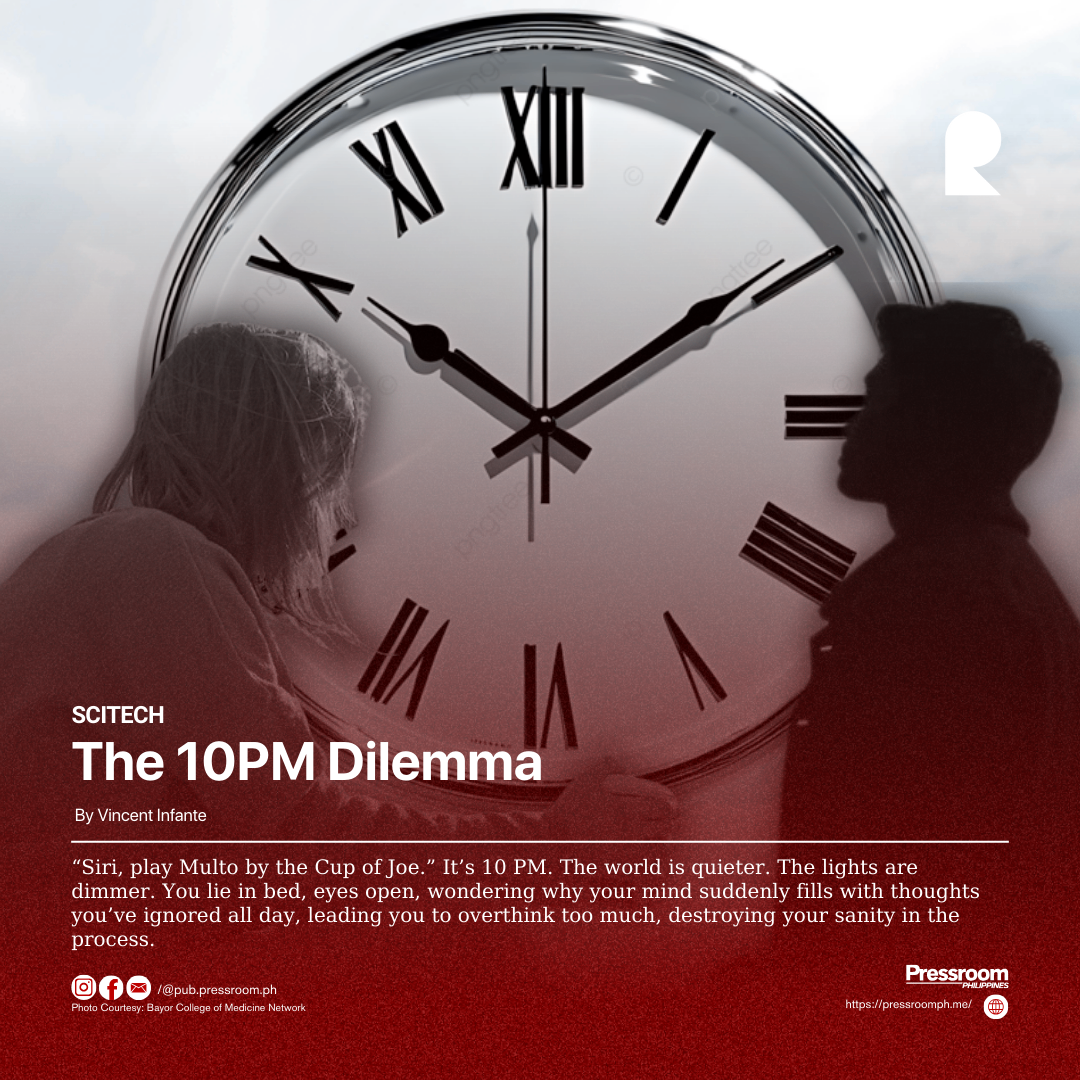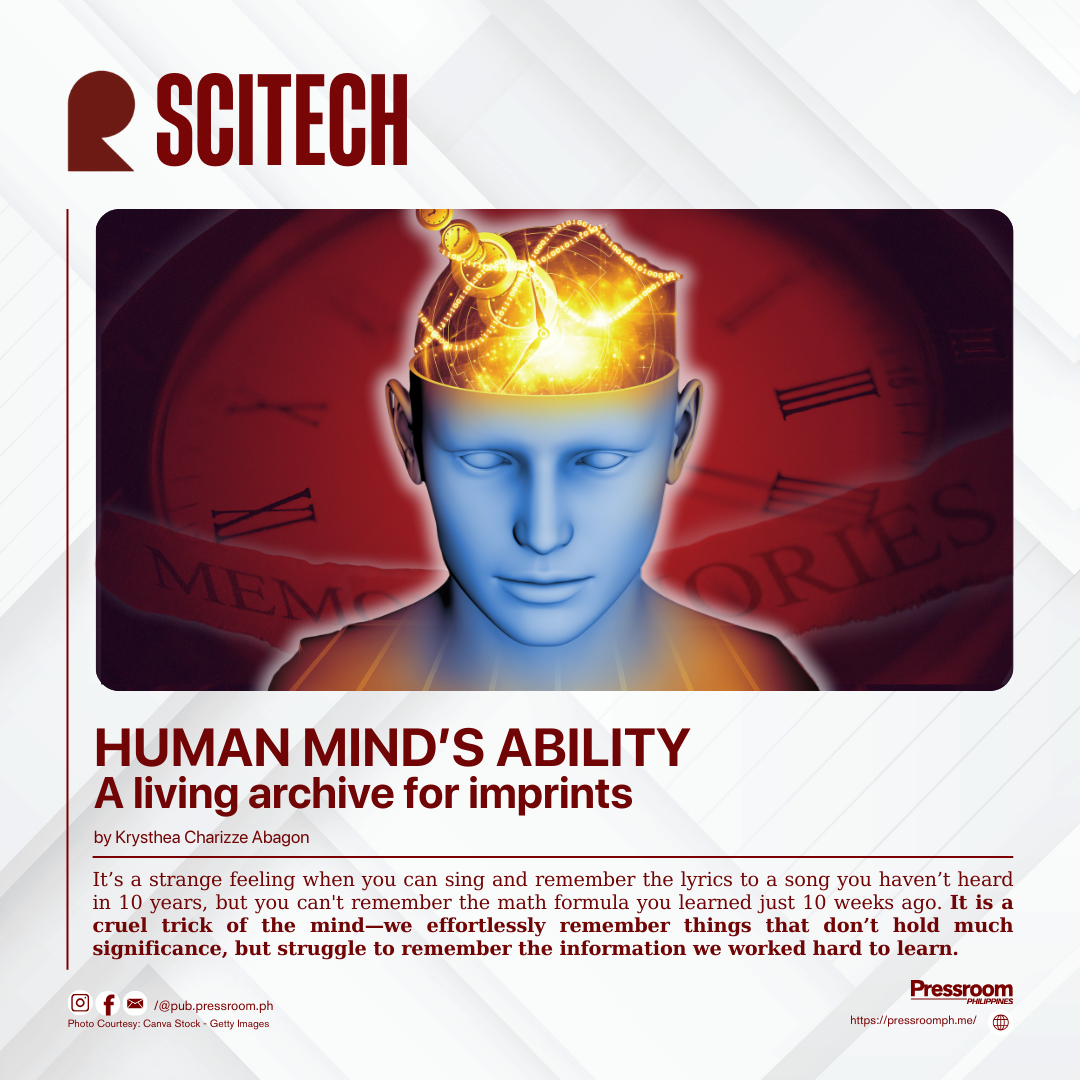𝘃𝗶𝗮 𝗩𝗶𝗻𝗰𝗲𝗻𝘁 𝗜𝗻𝗳𝗮𝗻𝘁𝗲, 𝗣𝗿𝗲𝘀𝘀𝗿𝗼𝗼𝗺 𝗣𝗛
“Siri, play Multo by the Cup of Joe.” It’s 10 PM. The world is quieter. The lights are dimmer. You lie in bed, eyes open, wondering why your mind suddenly fills with thoughts you’ve ignored all day, leading you to overthink too much, destroying your sanity in the process.
Have you ever felt so nostalgic at a certain moment, neglecting everything that can hinder that feeling? Psychologists and neuroscientists have long observed a shift in our cognitive and emotional states during nighttime, especially around 10 PM and later. “Siri, play ‘Cause You Have To by LANY next.”
This phenomenon, often dubbed the “yearning time,” is a mental tug-of-war between the urge to seek connection and the tendency to overthink. “Siri, cut it and play Umaasa by Calein.” At the core of this shift is the circadian rhythm of your internal body clock that regulates the sleep-wake cycle.
As melatonin levels begin to rise in the evening to prepare your body for rest, your brain also slows down its cognitive control. This means the prefrontal cortex, the part of the brain responsible for rational thinking and impulse control, becomes less active. “Siri, this time, play Kathang Isip by Ben&Ben."
With fewer mental brakes, your limbic system, which handles emotions, memories, and desire, takes charge. That’s why you might suddenly feel more vulnerable, nostalgic, or romantic. “Siri, play Multo once again, please.” It’s also why unresolved feelings, emotional wounds, or suppressed fears come flooding back. In disguise by those “multos.”
Studies show that people often report feeling lonelier and more emotionally intense at night. According to research published in the Journal of Affective Disorders, negative emotional thinking peaks in the evening, especially in adolescents and young adults. “Siri, for the next one play Burnout by Sugarfree.” This is partly because the brain, now quieter, turns inward, amplifying inner voices that are usually silenced by daily routines.
Meanwhile, the hormone oxytocin, often called the “love hormone,” is also more active during relaxed and quiet moments. Oxytocin is released during social bonding, romantic touch, and even daydreams of affection. “Siri, now play The Apartment We Won’t Share by NIKI.” At night, when the world slows down, your mind might crave the closeness and warmth it didn’t receive during the day—thus the sudden yearning for love or someone to talk to.
Overthinking and the rampant what-ifs are the brain’s desperate attempt to process unresolved thoughts. Dr. Ethan Kross, a psychologist at the University of Michigan, refers to this as “mental time travel.” At night, the brain revisits past events or future worries, trying to make sense of chaos, often without resolution. “Siri, shuffle my playlist and play Slipping Through My Fingers by ABBA.” That’s why minor worries feel like a life crisis at 10 PM. It’s normal. It’s biological. It’s being human.
Feeling all of that is human nature; it makes us feel more humane, but it doesn’t mean it’s healthy. Sometimes, the most scientifically proven thing we can do is allow ourselves to feel, breathe, and try again tomorrow with more light and less noise.
Don’t be afraid to “relapse.” It doesn’t mean you’re a failure. Moving on is a step-by-step process; breathe and ponder upon it calmly. Setbacks are temporary, and they will hone us to be stronger. Understanding more about this dilemma is to embrace who you are. The one and only you. “Siri, for the final song. Play “You’re Gonna Go Far by Noah Kahan.”






